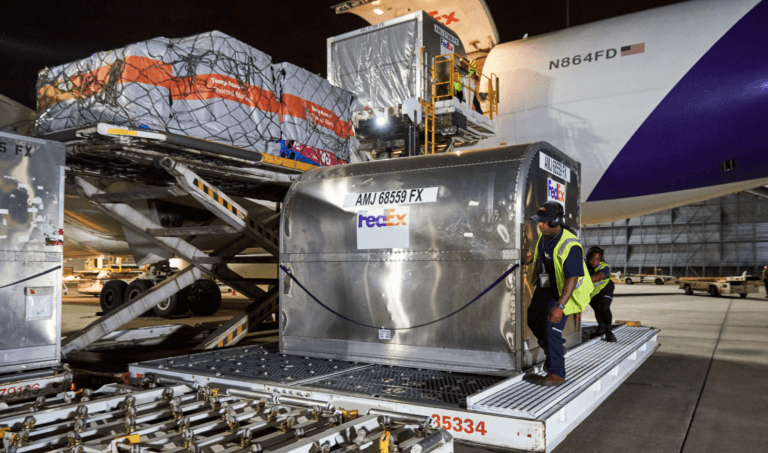The cold chain logistics sector has undergone significant transformation in the post-pandemic era, propelled by advancements in technology, evolving market demands, and a renewed focus on compliance. This landscape presents both challenges and opportunities for major forwarders and shippers, who are at the forefront of ensuring the safe and efficient transport of temperature sensitive goods.
“There has been a lot of focus on cold chain in the past five years,” Rachid Meftah, Healthcare Manager at FedEx, stated. “The demand from large customers in sectors like biotechnology and pharmaceuticals is increasing, as they need to ensure their goods are shipped in full compliance and at the correct temperatures. This growing market represents a major opportunity for us, as well as for the entire industry.”
Growing market
The demand for precision in cold chain logistics has surged, particularly from sectors like biotechnology and pharmaceuticals, where the transportation of temperature-sensitive products such as vaccines, gene therapies, and biologics requires meticulous care.
FedEx has leveraged its extensive global network to address these needs. The company has the world’s largest air cargo fleet and an unparalleled European road network, connecting the vast majority of hospitals and care institutions throughout Europe.
“We work closely with our large pharmaceutical customers to ensure we have the right capacity at the right time to deliver goods to the right destinations,” Meftah emphasised. “The market is increasing, and so is the need for highly reliable cold chain services.”
Cold chain challenges
One of the key priorities in the cold chain sector is precision. Products like vaccines and gene therapies are often highly sensitive to temperature variations, making the risk of temperature excursions a major concern. To mitigate this, FedEx uses specially designed and validated containers to provide reliable cold temperatures for up to 120 hours and works with specialised teams to monitor shipments around the clock. It was for this reason that FedEx also developed FedEx® Temp-Assure Advantage, an end-to-end, temperature-controlled solution combining high-performance reusable packaging with reliable network shipping.
“We have a global team of healthcare specialists, and our containers are qualified and tested to ensure the integrity of the shipment,” Meftah explained. “We always have a plan B in case of any temperature-related risk, and this is communicated both internally and to our customers.”
This crucially plays into FedEx’s focus on managing the “last mile” of delivery. FedEx’s integrated approach ensures that the same trained team handles the shipment from start to finish, giving customers confidence in the safe delivery of their products.
“We control every step of the journey, from the initial freight to the final mile, following the guidelines and applicable regulations to ensure the quality and safety of healthcare products,” Meftah continued.
Innovation in the cold chain
Digitalisation, including real-time tracking and temperature monitoring, has enhanced visibility for both the company and its customers. FedEx’s SenseAware Mobile system allows customers to track the temperature of their shipments and monitor whether the package has been opened or moved outside of predefined geofences.
“We provide real-time data to give our customers peace of mind, backed by a dedicated team who monitor shipments 24/7,” Meftah explained.
“We collect vast amounts of data, with multiple tracking scans from origin to destination, ensuring that every step of the journey is monitored. This allows us to improve our services on specific routes and delivery areas.”
Sustainability in the space
Sustainability has become a central theme in the logistics sector, and cold chain is no exception. FedEx has expressed a commitment to sustainable practices, such as using reusable packaging and electric vehicles for deliveries in urban areas.
“Sustainability and compliance are crucial topics today. While sustainability has often been a buzzword over the past decade, companies are now expected to take concrete actions,” Meftah expressed. “At FedEx, we’ve embraced sustainable practices, such as offering reusable packaging, which is increasingly demanded by the market.
“Additionally, as we deliver more in urban areas, we’ve incorporated electric vehicles into our fleet to reduce emissions. We’re deeply committed to sustainability, and we work closely with our customers to find ways to improve their own sustainability efforts as well.”
Moving focus
Pharmaceutical delivery has historically focused on B2B—delivering to hospitals and doctors. But the industry now seeing a clear trend toward direct-to-patient delivery. This shift poses a significant challenge, as it’s similar to e-commerce, but with sensitive goods like prescriptions being delivered directly to patients who may not be able to visit a hospital, such as those undergoing cancer treatment.
“FedEx is fully aware of this growing demand, and it’s clear that the direct-to patient model will be crucial in the coming years,” Meftah stated.
“It’s a dynamic market, and there’s always something new to take away. “We always remind ourselves that in healthcare, it’s not just a package—it’s a patient behind everything we move.”





